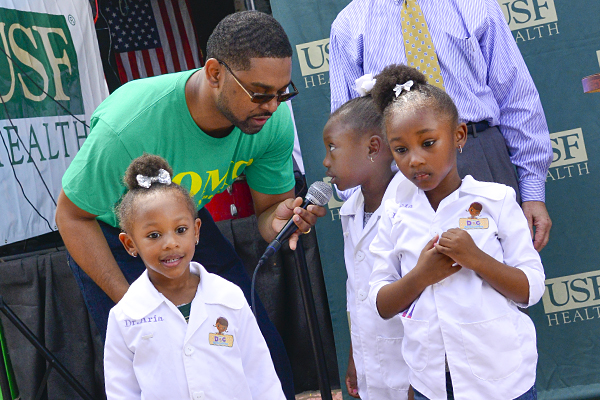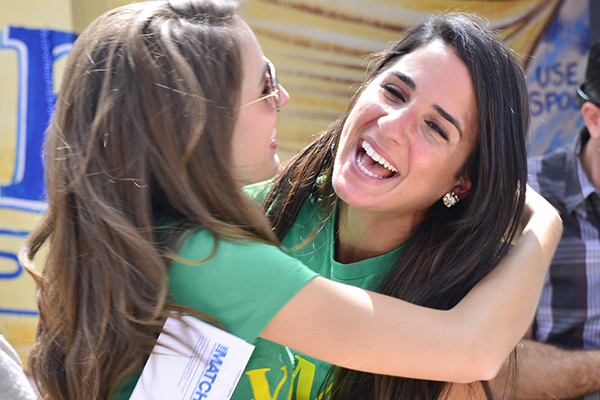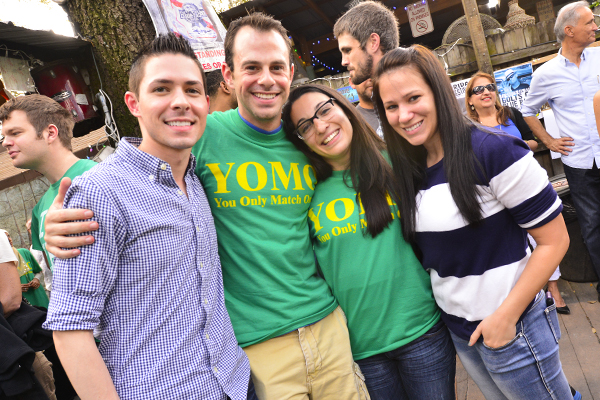CLICK HERE FOR MATCH DAY 2014 RESULTS
Alicia Billington was the first to find out.
“Plastic surgery at University of South Florida,” she said, as she opened the first envelope for this year’s Match Day.
As one of 120 senior medical students matching, Billington found out where she will spend the next few years as a physician in resident training.
Match Day is the annual ritual when senior medical students across the country learn where they will spend their residency, the next phase of the medical education. They’ve spent the past six months or more interviewing with residency programs and then ranking their picks within the National Residency Match Program (NRMP). Match Day is when students find out which programs chose them.
For most students, this day is a big deal because it’s such a defining moment: they hear where they will launch their careers. And for some, it’s the destination that has come after detours before arriving at medicine as a career.
***
Danielle Kurant remembers the first time she sat at a piano. She was 5. “I loved it from the start,” she said. Kurant is a senior medical student waiting calmly at USF’s Match Day 2014 to hear her named called. She is aiming toward pathology, but won’t say where she hopes to match. “I’m nervous and excited, but not worried,” she says, “I liked all the programs I interviewed with, so I’m okay with pretty much any of them.” Kurant’s love for music grew as she grew, and she continued playing on into high school and college. Performing took an interesting turn when, while an undergraduate at USF, she and some friends formed a group and performed on campus and at coffee and tea shops around the Tampa Bay area. “It was just for fun; I think we were only paid once,” she said. “I grew up learning and playing classical music so it was completely different being in a band and playing more popular songs.” Taking her love for music a step further, Kurant found her talent for composing. As an undergrad, she spent a semester focused on composing at Middlesex University in London. And in medical school, she was able to blend her passion for music with her love of medicine in a medical humanities Scholarly Concentration project. She also performed some of her works at the BRIDGE Talent Show. “I wrote a musical that followed a patient’s journey through our medical system, from diagnosis to treatment,” she said. “I wanted to show what a patient goes through when they get life changing news, like a diagnosis. It was a lot of hard work; definitely novel, but it got a great response. People weren’t expecting it. Composing a story like this is a different way of impacting people.” Kurant admits that, even with talent and intense interest, she knew performing wasn’t in her future as a career. “Although I couldn’t imagine life without music, I still knew I wouldn’t want to make a living at it,” she said. “I’m going to be a doctor.”
As Danielle Kurant opened her envelope, she faced the Livestream camera and told her friend to “Get my room ready. I’m coming to UVA!” That’s University of Virginia where she will specialize in pathology.
***
Lowell Dawson thought he was already in his career. A cardiovascular surgical technician in Tampa, Dawson was already making a comfortable living and starting a family. But on the job, he’d watch the surgeons work and be amazed, not just of their ability to open and fix a human body, but of their passion for doing it.And that’s when he realized he wanted something more. He applied to USF’s medical school and began classes Fall 2010. It was an odd feeling, he said, going back to school at an older age. While the average age of students starting medical school is 22, Dawson started at age 36. “I was the oldest guy, with a little more life experience, and a family,” he said. “But I think those extra years helped me to identify with patients and facilitated the way I deal with patients.” In those first two years, when most of his time was spent in the classroom, Dawson said would sometimes wonder if he’d made the right decision to go back to school. Add to that the birth of his third child in the fall of his freshman year, and there could easily have been reason to put school on hold. But in his third year, when most of his time was spent in clinical settings, he felt very comfortable. “It was kind of like wearing old shoes,” he said. “I already had a good comfort level with hospitals and I saw so many familiar faces there. It was sort of like a big homecoming. That’s when I really excelled.” Going to medical school while being a husband and a father can test you, but Dawson found a lot of support. “Actually, having a family really helped a lot,” Dawson said. “There were definitely challenges with keeping all the balls in the air. Got to say, my hat is off to my wife. She’s a champion.” Now, ready to graduate with is MD, he likes to tell other ‘older’ people considering medical school to go for it. “But being a little older really helped,” he said. “For a lot of things, I know how to prioritize a little better.” Dawson received a lot of support and encouragement from the surgeons he worked with as a surgical tech when he told them he was going to be a doctor. But his interests, and his desire to have lots of family time, are not in surgery. “Maybe interventional radiology,” he said. “It’s the best of all worlds for me and fits my life and my family.” And, he’s one of few medical students willing to say where he hopes to match. “We wanted to stay local, where we have a support system with my wife’s family to help with the kids,” he said. “We’re rooted in the community.”

Lowell Dawson and his wife and three children approached the front to accept his envelope. Dressed in child-size white coats, the three girls caught the hearts of everyone at Skipper’s. With Dad’s cues whispered in her ear, 5-year-old Aniya announced that Dad will be a diagnostic radiologist at USF.
***
Judith Puckett and Daniel Restrepo are both strong students who excelled in medical school. That dogged determination is also helping them handle the many emotions that go with matching as a couple in this year’s Match Day. The two started dating in their third year of medical school at USF while in the same clinical rotations. “We were friends at first,” Puckett said. “But time on the same clinical teams got us talking together more.” Although the NRMP tends to successfully match couples at the same institution, the process can still feel more uncertain for two than going through the match solo. Puckett said she spoke with many physicians during her residency interviews who had gone through couples match and felt reassured by their experiences. “I heard a lot about how the process has changed for the better,” Puckett said. “And USF was very supportive of us and gave us a smooth process to start our lives together. They gave us good advice.” Advice like support each other in your own interviews. “We always tried to plug each other at our interviews,” Restrepo said. “But it was reassuring when they had already read about your partner when you sit down to interview yourself.” Nervous? Excited? “It’s a combination of both,” Puckett said. “Matching as a couple adds a layer of stress and complexity.” “But it could go easier for us, with a partner in the same boat, than those opting to not do a couples match,” Restrepo added. “It’s nice to have each other.” Then he mentioned his countdown app, a smartphone application he and some classmates are using to watch the time tick down to Match Day. “Got to keep track,” he said, with a laugh. Like a lot of medical students, Puckett and Restrepo won’t divulge where they hope to land for their residency. Superstition, they supposed. Restrepo, originally from Colombia, studied biology as an undergrad. He wants to specialize in internal medicine. Puckett studied integrated physiology, and wants to specialize in psychiatry. Each took a year off before going to medical school. Puckett was a nanny, and Restrepo was an interpreter at Shands Hospital in Gainesville and tutored students preparing for their own MCAT exams. Both will be the first physicians in their families. And plenty of family on both sides will be at Match Day and tuning in via the Livestream. “In a lot of ways, Match Day is bigger than graduation,” Puckett said. “We know we’re going to graduate. But Match Day is like starting over again.” Together.
The entire second row erupted when couples-match Judith Puckett and Daniel Restrepo were finally called. Family members cheered again when they announced that both were heading to residencies at Massachusetts General Hospital, where Puckett will practice psychiatry and Restrepo will practice internal medicine.
***
Match Day 2014 started on a record high for USF.
Surrounded by USF senior medical students at Skipper’s Smokehouse in Tampa, U.S. Rep. Kathy Castor had just announced she was pushing legislation to increase the number of residency slots in the United States (see related story). What is normally an exciting day just became more exciting.
At noon, Steven Specter, PhD, associate dean for student affairs for the USF Health Morsani College of Medicine, began calling student names.
One by one, students came forward to accept an envelope, open it, and read to the crowd of classmates and family where they’re headed. Even medical school faculty came to see where the students end up being matched, including John Sinnott, MD, professor and chair of the Department of Internal Medicine at the USF Health Morsani College of Medicine.
“Internal medicine is delighted with our match,” Dr. Sinnott said. “We have matched superior students to a superior program. Attracting such quality trainees directly benefits our community.”
The student names were in random order, a tradition at USF because each student also brings up a dollar bill and places it in a box. The last student called up wins the cash.
Then, as all 120 students gathered at the foot of the stage so photographers could take group shots, they all cheered in unison, thrilled to have matched.

A USF Match Day first: A FSU senior medical student, Megan McDowell, couples matched with a USF student, Cameron Nereim. The husband and wife will both be conducting their residencies at USF Health Morsani College of Medicine.
Photos by Eric Younghans, USF Health Office of Communications



